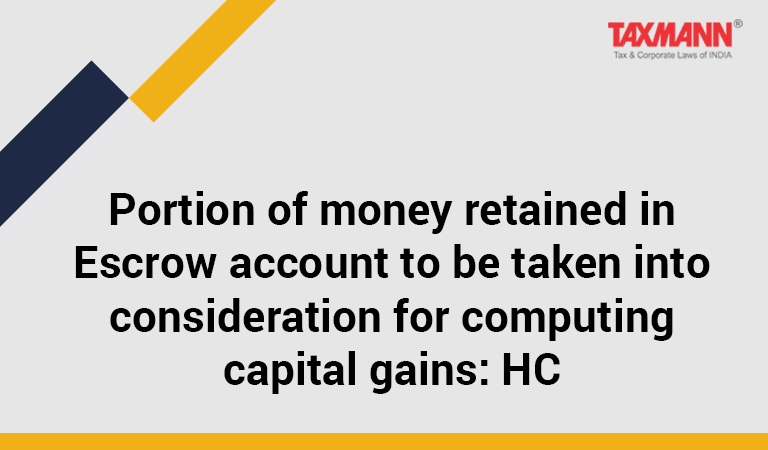Portion of money retained in Escrow account to be taken into consideration for computing capital gains: HC
- Blog|News|Income Tax|
- 2 Min Read
- By Taxmann
- |
- Last Updated on 10 September, 2021

Case details: Caborandum Universal Limited v. ACIT - [2021] 130 taxmann.com 133 (Madras)
Judiciary and Counsel Details
-
- T.S. Sivagnanam and Sathi Kumar Sukumara Kurup, JJ.
- Vikram Vijayaraghavan for the Appellant.
- T. Ravikumar, Sr. Standing Counsel for the Respondent.
Facts of the Case
Assessee filed a return of income, and its case was selected for scrutiny. During assessment proceedings, Assessing Officer (AO) noted that assessee had sold a plant for Rs. 31.146 crores, but it considered only Rs. 27.89 crores as sale consideration for computation of long-term capital gains. AO issued a show-cause notice to assessee. In response, assessee submitted that the difference was kept in an Escrow account to meet any contingent liabilities. After considering assessee’s submission, AO held that the amount kept in Escrow Account would only constitute an application of its income. The whole consideration had accrued to the assessee immediately on the execution of the agreement for sale, and the same had to be offered for tax in full.
Aggrieved by order of AO, assessee preferred an appeal before CIT(A). CIT(A) held that the amount kept in the Escrow account was neither received nor accrued to the assessee. Since assessee subsequently received the said amount after the stipulated period of the agreement, the said amount had been offered to tax in the year of receipt. Therefore, AO was not justified to tax the said amount in the year under consideration.
ITAT held
On revenue’s appeal, ITAT held that monies kept in the Escrow account were for meeting the claims that may arise on a future date. The interest accrued on the sums retained in the Escrow account had been agreed to belong to the seller, i.e., assessee, and also to be paid to him as per the instructions in the Escrow account. Assessee always had a right to receive the sums kept in the Escrow account. It did not change the agreed lump sum sale consideration, which stood finalised based on an agreement between the parties. Therefore, the quantification of deductions to be made from the sums lying in the Escrow account would not postpone the charge of such income deemed to be taxed in the year of transfer.
On further appeal, Madras High Court held that the retention of a particular amount in the Escrow account could not take away the amount from the purview of full consideration received or accruing in favour of assessee for computation of capital gains. The amount kept in the Escrow account was retained to cover four contingencies which were part of the indemnity clause. Assuming certain payoffs were to be made from the retention money will not in any manner alter the full and total consideration received by the assessee pursuant to the Business Sale Agreement. Thus, the entire sale consideration had accrued in favour of assessee during the assessment year under consideration. Even assuming that certain payments have been made from the amount retained in the Escrow account, it will not make or in any manner reduce the full value of consideration.
Disclaimer: The content/information published on the website is only for general information of the user and shall not be construed as legal advice. While the Taxmann has exercised reasonable efforts to ensure the veracity of information/content published, Taxmann shall be under no liability in any manner whatsoever for incorrect information, if any.

Taxmann Publications has a dedicated in-house Research & Editorial Team. This team consists of a team of Chartered Accountants, Company Secretaries, and Lawyers. This team works under the guidance and supervision of editor-in-chief Mr Rakesh Bhargava.
The Research and Editorial Team is responsible for developing reliable and accurate content for the readers. The team follows the six-sigma approach to achieve the benchmark of zero error in its publications and research platforms. The team ensures that the following publication guidelines are thoroughly followed while developing the content:
- The statutory material is obtained only from the authorized and reliable sources
- All the latest developments in the judicial and legislative fields are covered
- Prepare the analytical write-ups on current, controversial, and important issues to help the readers to understand the concept and its implications
- Every content published by Taxmann is complete, accurate and lucid
- All evidence-based statements are supported with proper reference to Section, Circular No., Notification No. or citations
- The golden rules of grammar, style and consistency are thoroughly followed
- Font and size that’s easy to read and remain consistent across all imprint and digital publications are applied



 CA | CS | CMA
CA | CS | CMA
